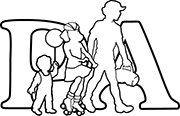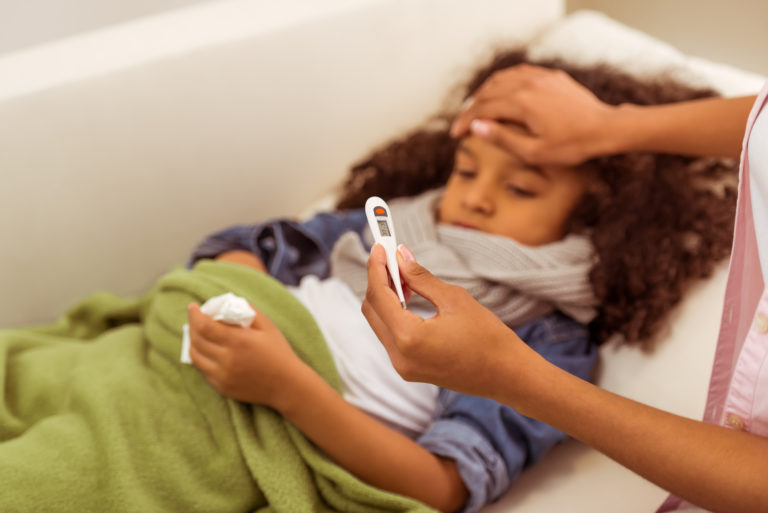During this time of cold and flu almost every family is bound to have at least one child with a fever. Knowing what to do when your child develops a fever can be confusing as there is a lot of misinformation out there, so let’s clear that up. The first thing to know is the definition of a fever which is 100.4oF or 38C and higher. Anything lower than that is not considered a fever, although it might be an elevated temperature for an individual. In a child under 6 months the temperature should be measure rectally with a digital thermometer. After 6 months any of the commercially available thermometers are fine to use and we do not use any formula for converting an underarm or ear temperature to the “true” temperature.
In an infant under 2 months old who has not received their first set of vaccinations it is important to call the doctor and be seen in the office for any fever. It’s not because the fever itself is any more dangerous, rather that there are bacterial illnesses that don’t cause many symptoms in children this age other than a fever. Thus, we are very careful in evaluating children under 2 months old with a fever. Unless you have spoken with your doctor do not give any medication to reduce the fever in infants of this age.
For children older than 2 months who have received their first set of vaccinations fever is just another symptom of illness. Unfortunately, the height and duration of the fever do not in any way predict how serious the underlying illness is. In fact, several benign viral illnesses are known to cause temperatures to 105oF. Fevers caused by the body will not cause brain or organ damage so there is no need to worry about quickly getting the temperature down. The body creates a fever by resetting the internal thermostat in the brain to a higher temperature. That’s why people will often feel cold or have chills when developing a fever- their body thermostat wants to be a 103oF and they are only 99oF.
While a fever is one of the immune systems ways of fighting illness, it can make a child feel pretty awful. Therefore, I recommend treating a fever to help a child feel smore comfortable, not because the fever itself is in any way harmful. If a child has a fever and is running around happily playing then there is no need to treat. Children from 2-6 months can be treated with acetaminophen (Tylenol). After 6 months parents can use either acetaminophen (Tylenol) or ibuprofen (Advil, Motrin). Due to the different metabolism of these medications they can be given in the same day and even several hours apart- some doctors will recommend alternating acetaminophen and ibuprofen every 3 hours for some fevers. It’s important though to document what medication is given and when especially when there are multiple caregivers so that children don’t receive an accidental overdose of medication. Keep these medications out of reach of children as they are flavored and taste good to children so if they are accessible can lead to an overdose.
Do not give anyone under the age of 18 aspirin for a fever as it can cause a potentially fatal illness cause Reye’s syndrome. Be very careful about cold/flu and headache preparations as these can continue multiple medications including aspirin derivates that can be harmful. They can also contain acetaminophen or ibuprofen in addition to other medications and can lead to double dosing if you are giving these for a fever. Do not rub a child down in alcohol to cool them off when they have a fever. A warm but not hot bath can feel good with a fever but a cold bath can cause shivering and worsening symptoms of the fever so we do not recommend those. When in doubt call our office to talk to one of our nurses about the fever and other symptoms your child might have. During the nighttime our office phone like will direct you to a number to page the on-call doctor.
Alaina M. Brown, MD FAAP

